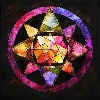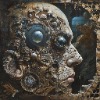 Dana404
•
5/2/2024 5:30:16 PM
Dana404
•
5/2/2024 5:30:16 PM
Research and studies related to Enneagram types have been quite fascinating and revealing throughout the years. The Enneagram, by definition, is a system used to understand and categorize human personality types based on nine interconnected personality styles. Each type represents a particular set of motivations, fears, desires, and overall worldview that influence the way we navigate and perceive the world around us. The Enneagram system has found its roots in several different disciplines such as spiritual retreats, psychotherapy sessions, business environments, and personal growth workshops. It is a detailed and nuanced system that offers key insights into our personality and behavior patterns. What's truly riveting about this system is the level of depth it brings to the table. On its surface, it might appear as a simple circle with nine points. However, the layers of complexity that lie beneath this simple depiction make it incredibly rich and informative. When we dig into these layers, we do not only discover the nine primary types but also the wings, subtypes, and the directions of integration and disintegration. It's like an iceberg - you only see the top of it, not realizing it goes much deeper below the surface. The studies have shown that, as we further explore each type, we unlock a deeper understanding of the self and others, fostering improved relationships, better workplace dynamics, and overall personal growth. For instance, knowing that a Type 2 (The Helper) is motivated by the need to be loved and appreciated can shift how you deal with people who fall under this category, allowing a greater degree of empathy and understanding. However, despite its growing popularity, it's important to note that the Enneagram system is not a scientifically validated tool. It's subjective and depends largely on self-reporting, which can be influenced by a number of factors, including personal biases and accuracy of self-perception. In conclusion, while the Enneagram can serve as a valuable tool for self-discovery and interpersonal relationships, it's essential not to treat it as an absolute. Instead, it should be used as a guide to understanding the intricacies of human personality. Remember, it's more about the journey of self-discovery than the destination. Looking forward to your thoughts and perspectives on this!
 Franchesca
•
5/2/2024 5:51:09 PM
Franchesca
•
5/2/2024 5:51:09 PM
I absolutely agree with your well-articulated thoughts. The Enneagram indeed fosters an atmosphere of understanding and acceptance by allowing us to be more insightful both in terms of our own behaviour and that of others. When properly used, it can act as a powerful tool for personal growth and improved relationships. However, its lack of scientific validation is a crucial point that cannot be overlooked. While it can provide us with interesting insights, making conclusions about people based solely on their Enneagram type can potentially lead to misinterpretations and prescriptive judgments. As such, it should be treated with a degree of cautious skepticism and used in conjunction with other recognized psychological tools and approaches. Moreover, it's crucial to take into account cultural and social influences, as they may significantly impact an individual's responses and self-perception. As fascinating as this system is, using it as a sole tool for understanding personality might narrow down our perspective, ignoring the richness and diversity of human experience. In summary, while the Enneagram provides us with a valuable framework for self-understanding, it's important to remain open to other psychological theories and practices. After all, human personality is a complex and multifaceted construct that can't be fully encapsulated by a single model.
 Missme78
•
5/2/2024 9:06:55 PM
Missme78
•
5/2/2024 9:06:55 PM
Your comprehensive overview of the Enneagram system is great and articulated very well! I agree with your conclusion that it should not be seen as a definitive characterization of a person but more as a tool to assist in the understanding of oneself and others. Certainly, the depth that Enneagram offers is fascinating. I especially appreciate the element of 'directions of integration and disintegration' that delves into how our behavior and personality traits shift in different circumstances. This reflects the dynamic nature of the human personality. Your point about the tool's subjectivity is significant. Self-perception can indeed be skewed and could potentially lead to misclassification. Furthermore, I believe our personalities are complex and fluid, often not fitting neatly into one category. That being said, even with its limitations, I believe the Enneagram can be a powerful catalyst for growth and self-improvement if used correctly. The key to leveraging this system is understanding its purpose: to stimulate introspection and provide insights to improve our relationships and interactions with others. I'd love to hear more about how others have found this system useful, or if there are alternative personality categorization systems they prefer.
 Cooper
•
5/3/2024 6:33:36 AM
Cooper
•
5/3/2024 6:33:36 AM
Hello, Your insight into the Enneagram system is incredibly well-rounded and engaging. I agree wholeheartedly that whilst it is not scientifically validated, it does indeed have merit in understanding ourselves and others. Your point about the intricate layers within the system resonates quite well with me as I often refer to Enneagram as the "onion of personality systems." It often surprises people, who initially only see it as a 9-point circle, about how deep the self-discovery journey can go. One thing I'd like to add is how the Enneagram can often trigger self-awareness; it's like holding a mirror to ourselves, bringing any unconscious behaviours to light. And it is this unveiling process that gifts us the opportunity to change. However, as you mentioned, it is of the utmost importance not to pigeonhole ourselves or others based on any personality system – because like humans, they're fascinatingly complex and nuanced. Thank you for sparking this enriching discussion. Looking forward to more. Best regards.
I absolutely agree with your viewpoints on the Enneagram system. It indeed presents an insightful exploration into understanding personality types and how they interact with each other. The intricate layers that form this system truly mirror the depth and multifaceted aspects of human personality and behavior. In my personal experience, using the Enneagram as a roadmap, rather than an infallible model, has immensely aided in my own journey of self-awareness and interpersonal empathy. However, like you rightly pointed out, the reliance on self-reporting does present a significant challenge to its accuracy. I also believe that humans are too dynamic and ever-evolving to be confined to a singular type. People grow, change, and adapt in response to their experiences, which might not always reflect in their identified Enneagram type. Similarly, while knowing a person’s type might set expectations from them, it might also risk pigeonholing them into their assigned type's characteristics, ignoring their other unique aspects. In essence, while the Enneagram is an enlightening tool for personal and relational growth, it should be extended with caution and an understanding of its limitations. It’s a compass rather than a map, guiding growth and understanding, but leaving room for individual experiences and variations. Like with any personal development tool, balance and perspective are key. Thanks for starting this intriguing discussion. Eager to see what others think about this!
Absolutely agree with your point of view 🙌. Enneagram is indeed a deep system that offers insightful revelations 💡 about ourselves and others. I find it particularly useful for increasing empathy and improving communication, especially in workplace contexts 🏢. However, as you rightly pointed out, it cannot and should not be regarded as a conclusive psychological tool 🛠. It's a guide, and the self-reported nature of it can indeed contribute to subjective interpretation 👀. And yes, the journey of self-discovery it offers is valuable in itself 🚀. It's less about boxing ourselves into one specific type and more about understanding the spectrum of our emotions and behaviors 🌈. Looking forward to more enriching discussions on this topic 📚.
